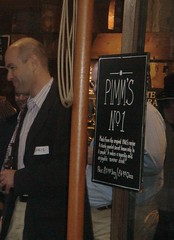 Most traditional ‘media’ – television, magazines, newspapers, etc, sustain themselves on advertising content – the cover fee, if there is one, is nominal and doesn’t go a long way to covering the costs of production. So, my question to the editor-in-chief of an extremely successfuly print and online magazine, Wired, — how long can this model sustain itself, given the rapid growth of social media and the ‘long tail’ – Chris’ concept – of media proliferation? That is to say, as blogs and niche media outlets continue to spread on the internet that have very low costs, and an increasingly high standard of content, how will the behemoths who rely on ad dollars react when advertising finally wakes up to the impact of the social media-scape and spreads their huge cash reserves more evenly? (Actually, I think I tried to be a bit more dramatic and asked how long Wired could survive in its current incarnation…)
Most traditional ‘media’ – television, magazines, newspapers, etc, sustain themselves on advertising content – the cover fee, if there is one, is nominal and doesn’t go a long way to covering the costs of production. So, my question to the editor-in-chief of an extremely successfuly print and online magazine, Wired, — how long can this model sustain itself, given the rapid growth of social media and the ‘long tail’ – Chris’ concept – of media proliferation? That is to say, as blogs and niche media outlets continue to spread on the internet that have very low costs, and an increasingly high standard of content, how will the behemoths who rely on ad dollars react when advertising finally wakes up to the impact of the social media-scape and spreads their huge cash reserves more evenly? (Actually, I think I tried to be a bit more dramatic and asked how long Wired could survive in its current incarnation…)
Chris’ response: “Oh. That question…” – which amused me; it did seem likely that if I didn’t ask it, someone else would. He guessed at 10-15 years before it happened, and when we chatted later – we talked about why. And the web, RSS and social media are clearly key contributing factors. How would traditional media be sustained? A part of me had a kind of doom and gloom thought to it all – that all we’d have left was vacuous blogs of people spouting off unresearched, primary-research free journalism… And to this Chris made two points – first he (metaphorically) slapped me into remembering just how blogs add value in other ways (hopefully this one too!), and second — he said that the traditional media that failed to embrace RSS, etc., and provide value in the new order of things, would disappear. But other media companies – and he flagged the BBC and Reuters as two in the UK that were doing good things – will find their way to a new model of sustainability. Obviously the beeb has a slightly different funding model…
Interestingly, in the period where business models adapt and print media starts to subside (and it will, no matter how much you like newsprint the future will be more, if not exclusively, digital) – Chris pointed out how substantial the savings would be for Wired, at least – who could cut costs by 60% by eliminating the print and distribution arms of their business.
60%. Jeez.
This isn’t true for everyone, though. The cost of producing a newspaper is far, far lower — the print process, volume of production, different distribution channels and cheap paper sees to that… so will be harder for a lot of newspapers than it will be for Wired to make the transition from being print-ad funded… to something else, that will probably involve Google adwords…
We talked about the problems with RSS too – primary amongst them the fact that people don’t get it. I’m on a personal crusade to explain the technology to everyone I speak to… but is it enough?? Will you join me in a campaign to get RSS for all? Will you?
On a side note: Chris was attending to promote his new book, the Long Tail, and was very generous with his time – it was a good experience meeting him and I’d recommend anyone interested in market dynamics, social media and the ‘new economy’ kick off with his blog, articles on Wired and the various Wikipedia entries, and if you’re hungry for more… buy the book!
